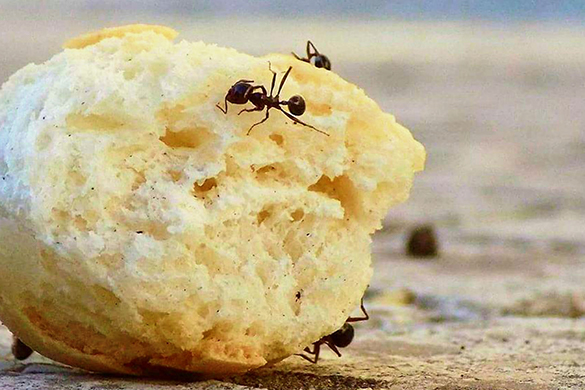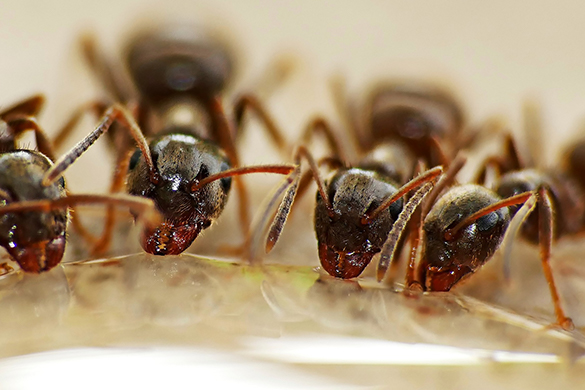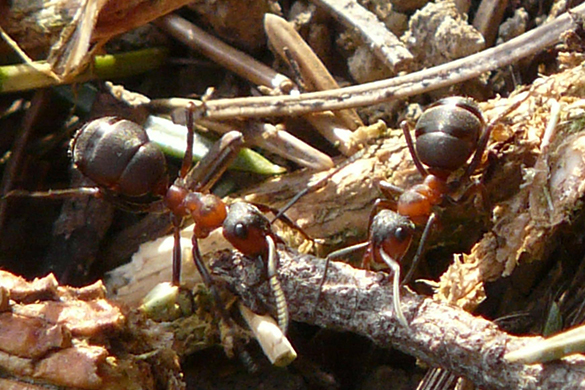Prevent pesky ants from moving their nest into your home. Knowing how to recognize the cause of an ant infestation in your home will help you halt their activities and prevent future infestations.

homeandgardeningguide.com gathered the following information and tips about ant infestations, why they enter your home and how to get rid of them.
Why Do Ants Infest Homes?
As a homeowner, the absolute last thing you want to see in your home is a winding trail of ants traveling to and from their food or water source. According to the National Wildlife Federation, there are more than 12,000 ant species worldwide. Driven by instinct, ants search wide and far from their nests for water, nutrients, and shelter, making your home a potential target for an entire colony to infest. Consider the following circumstances in your home that can lead to an ant infestation:
- Your pipes or faucets are leaking
- You’re leaving food out
- You have surfaces with food or grease residue
- You have dirty garbage cans/trash bins
- You have decaying wood somewhere in your home
Tip: An ant infestation will sometimes (rarely) go away on its own. However, it is more likely that your ant problem will move from one food or water source to another, perpetuating your home’s infestation.
Ant Infestation and Control
Before you start unloading cans of ant & roach killer all over your floors and baseboards, observe the following 5 issues potentially leading to an ant infestation and the measures you can take to halt their presence in your home:
1. Leaking Pipes or Faucets
Problem: Ants, like all other lifeforms, are in a constant struggle to gain access to nutrients, water, and shelter. Your leaking water connections, pipes, faucets, and appliances in your kitchen and bathrooms offer a life-giving water supply for an ant colony.

Solution: Inspect your water connections, toilets, and sinks thoroughly for even the smallest of leaks and repair them. Thoroughly inspect your home for other sources of moisture (including areas where rainwater may be getting in.
2. Food Left Out
Problem: Ants will almost always take advantage of accessible food sources, which explains why infestations are common in kitchens and places where leftover or dropped food may be. This is one of the principal causes of an ant infestation and one of the simplest to eliminate.
Solution: To avoid this type of ant infestation, immediately clean up food spills, store food in sealed containers, and keep fresh fruits in the refrigerator. You can also discretely spread some whole bay leaves, as they are a natural repellant to most ants.
3. Food and Grease Residue
Problem: Another less obvious food source in your kitchen that you may not even be aware of is left-behind grease and/or food residue. Often hidden on your stovetop or on the sides of food storage containers, these food particles easily attract ants.
Solution: Wipe off condiment dispensers, honey bottles, syrup containers, jam jars, and anything else that could leave a sticky or sugary residue. Regularly wipe down your stovetop after cooking, especially when making foods that typically splatter, like fried chicken, bacon, and sauces.
4. Dirty Trash Bins and Garbage Cans
Problem: It’s easy to miss or forget to regularly rinse out your garbage bins, soda bottles, and canned food jars before throwing them away. Ants have no problems searching your trash to find your leftover food scraps.
Solution: Try to regularly clean out your garbage bins, especially those in your kitchen. Be sure to also rinse out food packaging waste before you toss any of it in the trash.
5. Decaying Wood
Problem: Leaky pipes or a severe rainstorm can saturate wood components in and around your home, creating the perfect conditions for carpenter ants to move their nest or establish a satellite nest (this species typically nests in moist or decaying wood).

Solution: Remove and replace any rotting wood in your home’s structure, and remove any dead or dying trees, tree stumps, and fallen branches from your yard. It is also wise to store any firewood at least 20 feet away from your home!
Ant Infestation
In this article, you discovered essential information about ant infestations in your home, why they invade your home, and how to get rid of them.
Knowing how ants seek food and water and communicate with each other will help you identify and eliminate the attractions your home presents them.
Ignoring an ant infestation in your home can lead to severe structural damages and become extremely frustrating when you start finding ants in all of your food and anywhere in your home they can find a water source.
Sources:
consumerreports.org/pest-control/how-to-get-rid-of-ants-in-the-house-a3627053544/
nwf.org/Educational-Resources/Wildlife-Guide/Invertebrates/Ants
nationalgeographic.com/animals/invertebrates/facts/ants
Visit http://www.homeandgardeningguide.com/repairs/pest-control/ for more pest control articles, resources and how-to tips.
The post 5 Ways to Eliminate Ants in Your House appeared first on http://www.homeandgardeningguide.com
No comments:
Post a Comment